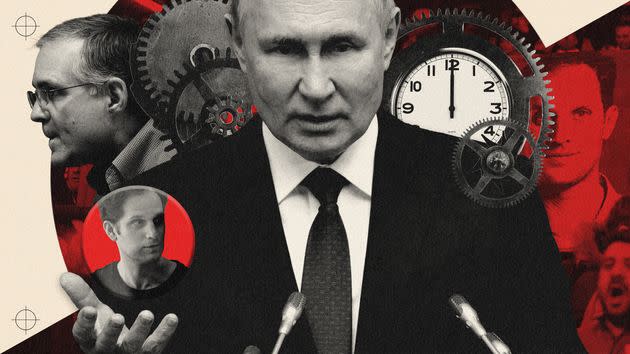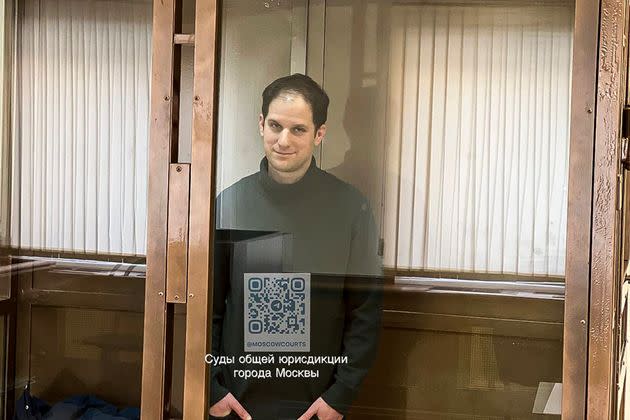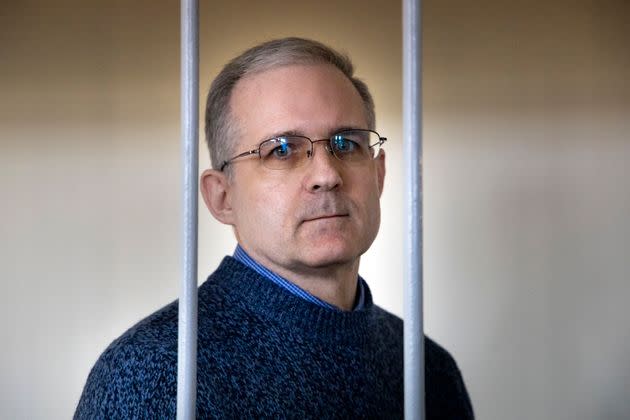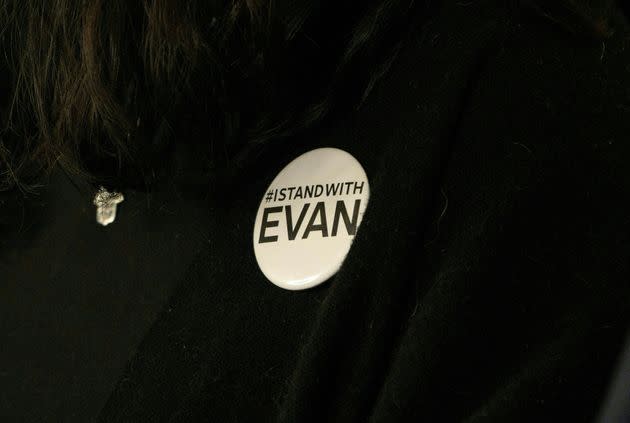Evan Gershkovich Has Been Jailed In Russia For A Full Year. What Will It Take To Free Him?
- Oops!Something went wrong.Please try again later.
- Oops!Something went wrong.Please try again later.
- Oops!Something went wrong.Please try again later.
- Oops!Something went wrong.Please try again later.
- Oops!Something went wrong.Please try again later.

Nearly a year ago, Russian authorities detained Wall Street Journal reporter Evan Gershkovich on espionage charges while he was on a reporting assignment in the city of Yekaterinburg.
Gershkovich, whom the U.S. State Department has designated as wrongfully detained, was accredited by Russian authorities to work as a journalist in the country.
His detention came as chilling news to onlookers around the world, given that Gershkovich was the first American to be arrested in Russia on spying charges since the Cold War.
The Journal and the U.S. have forcefully pushed back against the accusations, urging Moscow to immediately release him. But this hasn’t happened — at least so far.
In February, a Russian court denied Gershkovich’s appeal, ruling that he must stay behind bars until at least the end of March.
“It has been extraordinarily difficult to watch these proceedings play out, each one an indefensible attempt to portray Evan as something other than what he is — a journalist,” Dow Jones CEO Almar Latour and WSJ Editor-in-Chief Emma Tucker said in a statement following the decision.

But Gershkovich is not the only American journalist apparently targeted by Russia.
A Russian court in February extended the pretrial detention of Alsu Kurmasheva, an American-Russian journalist for Radio Free Europe/Radio Liberty, which is funded by the U.S. Congress.
Kurmasheva, who lives in Prague, was arrested at a Russian airport on Oct. 18, 2023, while she was preparing to return home from a visit to her sick mother. She was charged with failing to register as a foreign agent, and accused of disseminating “false information” about the Russian military.
Human rights groups have denounced Kurmasheva’s arrest, and RFE/RL President Stephen Capus said she has been unfairly targeted because she is a U.S. journalist.
Paul Beckett, an assistant editor at The Wall Street Journal, described the incarcerations of Gershkovich and Kurmasheva as “frontal attacks on press freedom.”
Beckett said Russian President Vladimir Putin’s practice of detaining Americans is a “transactional exercise” to gain leverage over the U.S. When it comes to specifically putting reporters behind bars, Beckett said, Putin gets an additional advantage “because it has such a chilling effect on the flow of information and trustworthy information out of Russia.”
Following Gershkovich’s arrest on March 29, 2023, many American news organizations and outlets that employed Americans withdrew from Moscow to protect their staff. Many independent Russian media workers also fled the country.
Anton Troianovski, the Moscow bureau chief for The New York Times, is now based in Berlin, following the paper’s decision in 2022 to temporarily remove its journalists from Russia due to the risks. He told The Guardian’s Margaret Sullivan that Gershkovich’s detention shocked him both personally and professionally.
“We took it as a message that the risks were very serious for on-the-ground reporting there,” Troianovski said.
The arrests of Gershkovich and Kurmasheva have occurred during a period of heightened tensions between Russia and the U.S., amid the war in Ukraine and against the backdrop of an upcoming U.S. presidential election in which President Joe Biden is expected to face off with former President Donald Trump.
If Putin thinks he can gain a better PR coup by waiting for a more favorable opportunity to negotiate under a Trump presidency, then he will be perfectly content to do this.Precious Chatterje-Doody, senior lecturer in politics and international studies at the Open University
Precious Chatterje-Doody, a senior lecturer in politics and international studies at the Open University, said Putin will only have an incentive to release jailed Americans like Gershkovich if he “can trade them for someone worthwhile and then portray this as a victory at home.”
“If, however, the Kremlin cannot strike a deal to its liking then there will be no urgency,” Chatterje-Doody told HuffPost in an email. “Even Russian citizens imprisoned abroad are seen primarily as bargaining chips rather than as people, and if Putin thinks he can gain a better PR coup by waiting for a more favorable opportunity to negotiate under a Trump presidency, then he will be perfectly content to do this.”
The U.S. was reportedly in the process of negotiating a prisoner swap agreement that would have secured the release of Gershkovich; fellow wrongfully designated American Paul Whelan, a former U.S. Marine; and Russian opposition leader Alexei Navalny in exchange for Vadim Krasikov, a former member of Russia’s state intelligence service held in Germany.
Navalny’s allies have argued that the prospect of the deal prompted Putin to have Navalny killed in prison in February, because he couldn’t bear the thought of seeing one his biggest foes walk free.
The opposition leader, who was being held in a Russian penal colony in Kharp, a city in northern Russia, collapsed after he felt unwell during a walk on Feb. 16. Emergency services did not manage to revive him, and he was pronounced dead later that day, the country’s Federal Prison System said.
Navalny’s death could also indirectly affect Americans detained in Russia.
“Navalny’s death complicates arrangements for a prisoner swap, because if it were to go ahead on anything similar to the lines that [were] reportedly discussed before his death, then it would send a clear message to Russia that the U.S. is willing to tolerate oppositionists’ deaths in custody,” Chatterje-Doody said.
The Financial Times reported that after Navalny’s death, the German government became less interested in taking part in a swap that would involve the release of Krasikov, who is serving a life sentence in the country for killing a Georgian citizen of Chechen descent in Berlin in broad daylight in 2019.
“They don’t have a poster child they’re looking to get out,” a U.S. official told the FT.
Despite this, Alex Brideau, who leads the Eurasia Group’s coverage of Ukraine, Russia’s foreign policy, and the broader Eurasia region, told HuffPost that Navalny’s death doesn’t necessarily make a deal less likely.
Brideau explained that in the past, Russia would deny it was prepared to engage in discussions with foreign governments, including the U.S., about prisoner swaps, and would characterize arrests as straightforward law enforcement operations.
The Russian leader’s approach in the past year, being more open about his willingness to enter into negotiations with the U.S. about prisoners, “does suggest that Putin is still thinking about how he can get a deal that gets him the people that he wants returned back to Russia,” Brideau said.
Whelan told CNN he found the news of Navalny’s death “extremely troubling.”
“If they are willing to face the repercussions from the world for doing in somebody like Navalny, they’re not going to think twice about doing in someone like me, and then blaming the United States for not bothering to get me back in five years,” Whelan said.
Brideau said that while U.S. officials will certainly be worried about the treatment of American prisoners like Whelan, the immediate concern following Navalny’s death “has been that there’s a risk to the Russian opposition activists and politicians who are facing these conditions.”

Whelan was arrested in 2018 on espionage charges and sentenced to 16 years in prison in June 2020. He has denied wrongdoing.
Russia in December 2022 agreed to free WNBA star Brittney Griner in exchange for international arms dealer Viktor Bout, who was being held in the U.S. While U.S. officials pressed for Whelan to be included in that swap, the Kremlin insisted the agreement could only involve two people, according to an unnamed source cited by NBC News.
Whelan was also left out of an earlier prisoner swap that saw former U.S. Marine Trevor Reed released in exchange for Kostantin Yaroshenko, a Russian man who was serving a 20-year sentence in the U.S. after he was convicted of drug smuggling.
In an interview with Tucker Carlson shared on X, formerly Twitter, last month prior to Navalny’s death, Putin hinted that he may be prepared to free Gershkovich if he were to reach a deal with U.S. authorities.
“I do not rule out that the person you refer to, Mr. Gershkovich, may return to his motherland,” Putin said. “We are ready to talk ... But we have to come to an agreement.”
Putin also appeared to suggest he would want Krasikov to be involved in a potential swap.
Carlson did not mention Whelan, and also failed to bring up Navalny during the nearly two-hour interview in Moscow.
We will also work around the clock to bring home Evan and Paul, Americans being unjustly detained all around the world.President Joe Biden
Lawmakers across the political spectrum have called on Russia to free jailed U.S. citizens in the country.
“We will also work around the clock to bring home Evan and Paul, Americans being unjustly detained all around the world,” Biden said during his State of the Union address earlier this month.
Gershkovich’s parents attended Biden’s speech as guests of House Speaker Mike Johnson (R-La.).
“By hosting Evan’s parents, Congress will shine a spotlight on the unjust detention of their son,” Johnson said in a statement at the time. “The United States must always stand for freedom of the press around the world, especially in places like Russia, where it is under assault. The Administration must bring Evan home.”

Beckett told HuffPost it is heartening to see that Gershkovich’s case has remained a “bipartisan concern,” noting the unanimous approval of a House resolution last year calling for the release of the reporter and other jailed Americans in Russia.
His colleagues are trying to keep Gershkovich’s name in the spotlight in hopes that it will aid his case in potential government-to-government talks between the Kremlin and the White House.
A series of events have been planned to mark the year since Gershkovich’s detention, including swims at Brighton Beaches around the world on March 23, given his family’s ties to Brighton Beach in New York, which is home to a large Russian immigrant community.
The Journal is planning a 24-hour read-a-thon at its New York headquarters next week, where Gershkovich’s friends, family and colleagues will take part in a public reading of his reporting.
While the anniversary is “a painful moment in many ways,” Beckett said, “it’s also meant for everybody to dig back in and do what they can to help.”
